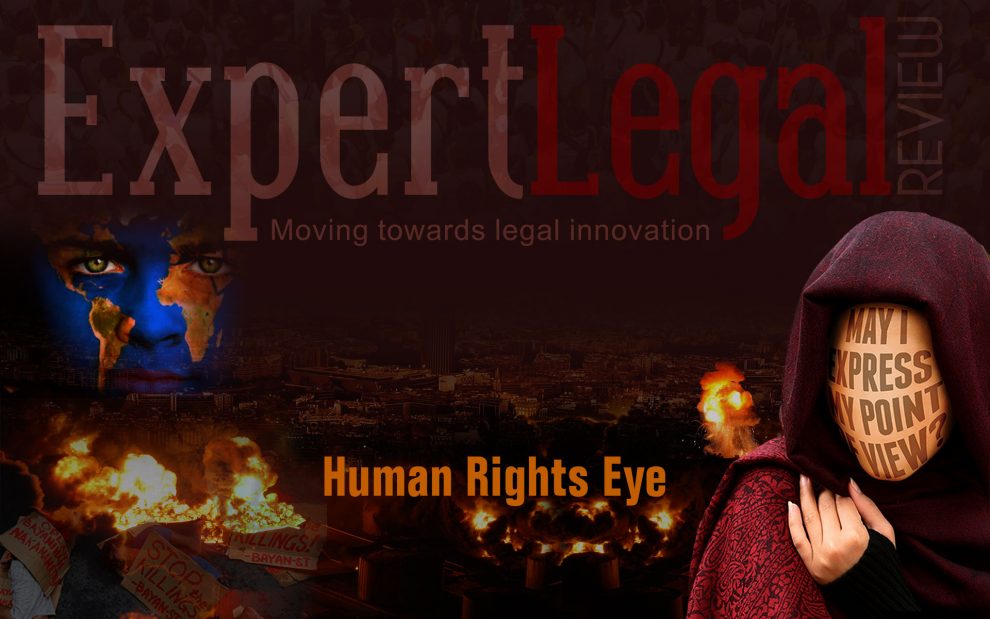Debris everywhere, blood on the walls, unidentified bodies scattered, shocked witnesses and the voices of wailing filling the atmosphere; that’s the scenario after a brutal attack of terrorism. Tears filled eyes of mothers whose sons won’t return ever and the sisters who won’t see their brothers again. Terrorism is like a termite weakening the very foundations of this world especially human rights. Multiple killings and harassment have become a routine. Not a day passes by when a tragedy doesn’t strike any city of the world. Terrorism is a global issue; violating every stance the United Nations stands for.
Human rights are relevant to terrorism as concerns both its victims and its massacrers. The concept of human rights was first expressed in the 1948 Universal Declaration of Human Rights, which established “recognition of the inherent dignity and inalienable rights of all members of the human family.” The innocent victims of terrorism suffer an attack on their most basic right to live in peace and security.

As members of the human family, the suspected cutthroats of attacks also have rights in the course of their preventive custody and litigation. They have all the rights not to be subjected to torture or any other sort of degrading treatment, the right to be presumed innocent until they are deemed guilty of the crime and the right to public trial.
The horrifying terrorist attacks on 11 September 2001 in New York and Washington shook the whole world. Thus, making it a top political priority for the international community. The UN Security Council adopted Resolution 1373 under Chapter VII of the UN Charter, on 28 September 2001, calling upon states to implement more persuasive counter-terrorism measures at the national level. Moreover, the emphasis was on the introduction of steps to increase international co-operation in the struggle against the chaos.
The Resolution created the Counter-Terrorism Committee (CTC) to monitor actions on this issue and to receive reports from states on measures taken. Following the adoption of Resolution 1373, a substantial number of states have adopted plans for further measures to combat terrorism. Security Council Resolution 1456, adopted in 2003, called on the CTC to consider human rights in its work; yet the Committee has ignored the impact on human rights of its activities in relation to repressive governments that justify human rights violations with reference to antiterrorism measures. Another issue of concern is the way entities or individuals are added to the terrorist list maintained by the Security Council. The absence of review or appeal for those listed raises serious accountability issues and possibly violate fundamental human rights norms and Conventions. The attacks on trains in Madrid in 2004 and the London transport system in 2005 reminded world leaders that terrorism poses a serious threat to the security and the lives and freedom of citizens worldwide. In Resolutions 1530 (2004) and 1611 (2005) the Security Council condemned the attacks and expressed its reinforced determination to combat all forms of terrorism, in accordance with its responsibilities under the UN Charter.
reports from states on measures taken. Following the adoption of Resolution 1373, a substantial number of states have adopted plans for further measures to combat terrorism. Security Council Resolution 1456, adopted in 2003, called on the CTC to consider human rights in its work; yet the Committee has ignored the impact on human rights of its activities in relation to repressive governments that justify human rights violations with reference to antiterrorism measures. Another issue of concern is the way entities or individuals are added to the terrorist list maintained by the Security Council. The absence of review or appeal for those listed raises serious accountability issues and possibly violate fundamental human rights norms and Conventions. The attacks on trains in Madrid in 2004 and the London transport system in 2005 reminded world leaders that terrorism poses a serious threat to the security and the lives and freedom of citizens worldwide. In Resolutions 1530 (2004) and 1611 (2005) the Security Council condemned the attacks and expressed its reinforced determination to combat all forms of terrorism, in accordance with its responsibilities under the UN Charter.
Western democracies with long records of an essential respect for human rights and institutional checks on excessive state power also took advantage of 9/11 to erode checks on state power and undermine human rights.
The Bush Administration, as the author of the “global war on terror” has taken significant steps in this direction. Australia, the UK, and European countries have also found advantage in restricting civil liberties for some citizens, and the European Union has been accused by human rights organizations of facilitating the rendition—the illegal detention and transport of terrorist suspects to prisons in third countries, and where their torture is all but guaranteed.
According to Human Rights Watch, the list of countries who found it to their benefit to use terrorism prevention to “intensify their own crackdown on political opponents, separatists and religious groups,” or to “advance unnecessarily restrictive or punitive policies against refugees, asylum-seekers, and other foreigners” immediately following the 9/11 attacks includes: Australia, Belarus, China, Egypt, Eritrea, India, Israel, Jordan, Kyrgyzstan, Liberia, Macedonia, Malaysia, Russia, Syria, the United States, Uzbekistan and Zimbabwe.
“intensify their own crackdown on political opponents, separatists and religious groups,” or to “advance unnecessarily restrictive or punitive policies against refugees, asylum-seekers, and other foreigners” immediately following the 9/11 attacks includes: Australia, Belarus, China, Egypt, Eritrea, India, Israel, Jordan, Kyrgyzstan, Liberia, Macedonia, Malaysia, Russia, Syria, the United States, Uzbekistan and Zimbabwe.
The focus by human rights groups and others on the preservation of terrorist suspects’ human rights may seem jarring, or as if that focus comes at the expense of attention to the human rights of terrorism’s victims.











